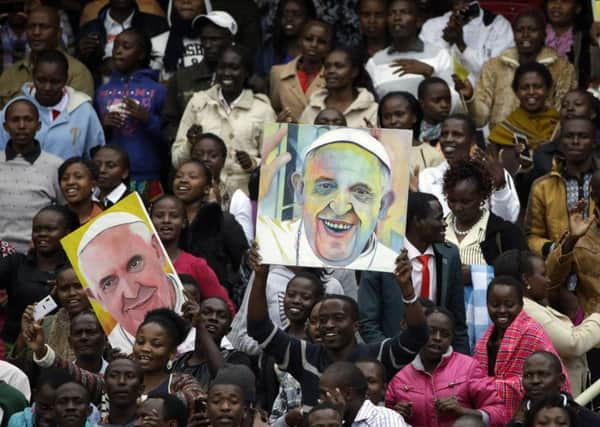Pope condemns ‘urban exclusion’ on shantytown visit


Residents of the Kangemi slum lined the mud streets to welcome the Pope, standing alongside goats and hens outside the corrugated tin-roofed shacks where the shantytown’s many small businesses operate: beauty parlours, cellphone “top-up” shops and storefront evangelical churches.
Those lucky enough to gain access to St Joseph’s parish erupted in cheers and hymns when Francis arrived at the open-sided church that serves the slum of about 50,000 people.
Advertisement
Hide AdAdvertisement
Hide AdIn remarks to the crowd, the Pope insisted that everyone should have access to water, a basic sewage system, garbage collection, electricity as well as schools, hospitals and sport facilities.
“To deny a family water, under any bureaucratic pretext whatsoever, is a great injustice, especially when one profits from this need,” he said.
The pope has frequently insisted on the need for the three “Ls” – land, labour and lodging – and yesterday he focused on lodging as a critical issue facing the world amid rapid urbanisation that is helping to upset the Earth’s delicate ecological balance.
Kangemi is one of 11 slums dotting Nairobi, East Africa’s largest city, and people here struggle without basic sanitation.
Francis denounced the “injustice of urban exclusion” that has forced some 60 percent of Nairobi’s population to move to slums that cover just 6 per cent of the city’s residential land, according to 2014 figures from the UN Habitat programme.
“These are wounds inflicted by minorities who cling to power and wealth, who selfishly squander, while a growing majority is forced to flee to abandoned, filthy and run-down peripheries,” Francis said.
The Pope told residents that people forced to live in slums actually share values that wealthier neighbourhoods can learn from: solidarity and looking out for one another. But he said it was unjust that entire families are forced to live in unfit housing, often at exorbitant prices.
He called for a “respectful urban integration” with concrete initiatives to provide good-quality housing for all.
Advertisement
Hide AdAdvertisement
Hide AdHis message was welcomed by residents of Kangemi, who said the city only pipes in water three days a week, Tuesday through Thursday, but it’s not safe to drink. Garbage collection goes to only those who can pay for it.
“Some people don’t have toilets in their homes,” said Emily Night, a mother of two who works at the St. Joseph’s HIV counselling programme. Things are not much better in nearby Kabiria slum.
“It’s difficult. There is no water. We drink well water,” said Rebecca Nanzala, who attended the pope’s visit with one of her children.